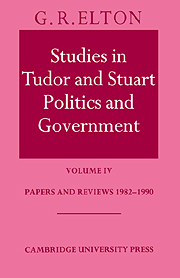Book contents
- Frontmatter
- Contents
- Preface
- Acknowledgments
- Abbreviations
- I POLITICS AND THE REFORMATION
- 49 The State: Government and Politics under Elizabeth and James
- 50 Lex Terrae Victrix: the Triumph of Parliamentary Law in the Sixteenth Century
- 51 Human Rights and the Liberties of Englishmen
- 52 King Henry VII
- 53 Wales in Parliament, 1542–1581
- 54 Piscatorial Politics in the Early Parliaments of Elizabeth I
- 55 English National Self-consciousness and the Parliament in the Sixteenth Century
- 56 Thomas More and Thomas Cromwell
- 57 Lancelot Andrewes
- 58 Persecution and Toleration in the English Reformation
- 59 Auseinandersetzung und Zusammenarbeit zwischen Renaissance und Reformation in England
- 60 Humanism in England
- 61 Luther in England
- 62 Die europäische Reformation: Mit oder ohne Luther?
- II ON HISTORIANS
- Index of Authors Cited
- General Index
62 - Die europäische Reformation: Mit oder ohne Luther?
Published online by Cambridge University Press: 03 February 2010
- Frontmatter
- Contents
- Preface
- Acknowledgments
- Abbreviations
- I POLITICS AND THE REFORMATION
- 49 The State: Government and Politics under Elizabeth and James
- 50 Lex Terrae Victrix: the Triumph of Parliamentary Law in the Sixteenth Century
- 51 Human Rights and the Liberties of Englishmen
- 52 King Henry VII
- 53 Wales in Parliament, 1542–1581
- 54 Piscatorial Politics in the Early Parliaments of Elizabeth I
- 55 English National Self-consciousness and the Parliament in the Sixteenth Century
- 56 Thomas More and Thomas Cromwell
- 57 Lancelot Andrewes
- 58 Persecution and Toleration in the English Reformation
- 59 Auseinandersetzung und Zusammenarbeit zwischen Renaissance und Reformation in England
- 60 Humanism in England
- 61 Luther in England
- 62 Die europäische Reformation: Mit oder ohne Luther?
- II ON HISTORIANS
- Index of Authors Cited
- General Index
Summary
In diesem Jubiläumsjahre bestgeht die Versuchung, die Reformation mit Luther gleichzustellen, in besonderem Maße – oder jedenfalls die Annahme, daß es ohne ihn nie zur Reformation gekommen wäre. Manche Historiker gerade in Deutschland haben dieser Versuchung nachgegeben, was sich leicht entschuldigen läßt, wenn man die Größe des Mannes betrachtet. Aber bedeutet Reformation eben einfach Luther? Auf einem vor etwa 12 Monaten abgehaltenen Kolloquium über Luther in der Neuzeit nahm man sich vor, ihn als eine allgemein europäische Figur zu behandeln, blieb aber immer wieder im deutschen Umkreis stecken. Bei mir erweckte dies den Gedanken, daß Luther vielleicht wirklich nur eine Bedeutung für Deutschland besaß. Anders wo ist er wohl bekannt und vielfach auch verehrt worden, hat aber nur selten Spuren hinterlassen, selbst in Gegenden, die die Reformation mit offenen Armen empfingen. War er wirklich fur ganz Europa der Ursprung der Reformation? Diesem Gedanken, der vielleicht in diesem Jahr etwas ikonoklastisch erscheinen mag, möchte ich heute Abend ein wenig nachgehen.
Selbst in Deutschland war ja Luthers Renommée bis zum Ausbruch dieses Jahres etwas im Niedergang. Gewiß, bei den beruflichen Kirchenhistorikern und den Beiträgern zum Luther-Jahrbuch blieb er weiterhin im Mittelpunkt, aber in den Gebirgen und Meeren, die diese ein wenig selbstgefällige Insel der Forschung umgeben, donnerte und blitzte es gefährlich. Vom Osten her drohte ein doppeltes Gewitter. Einerseits war man sich dort doktrinär sicher, daßdie Unruhen des 16. Jahrhunderts weniger mit der Religion als mit den sogenannten sozialen Verhältnissen zu tun hatten: Religion ist ja marxistisch gesprochen nur ein Paraphänomenon.
- Type
- Chapter
- Information
- Studies in Tudor and Stuart Politics and Government , pp. 246 - 264Publisher: Cambridge University PressPrint publication year: 1992



